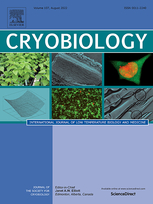
Investigating the cryoablative efficacy of a hybrid cryoprobe operating under freeze thaw cycles.
Author(s) : ZHAO X., CHUA K. J.
Type of article: Article
Summary
Cryoprobes are minimally invasive tools that apply extremely low temperatures to eradicate undesirable cancerous tissue during cryosurgery. At times, they may generate thermal injury to neighboring good tis- sue leading to the case of over-ablation. The magnitude of this problem becomes significant when tumors are complex, large size and irregular in shape. In this work, we propose a simple yet pragmatic hybrid cryoprobe which can potentially promote better surgical efficacy by improving tumor ablation while reducing undesired thermal injury to the neighboring tissue. To evaluate the performance of the pro- posed probe operating under cyclic freeze–thaw conditions, a detailed bioheat transfer model incorporating tissue death functions was developed. In-vitro experiments conducted to validate the model yielded a good agreement of 6.7%. We numerically studied the thermal impact of employing the hybrid cryoprobe on tissue temperature distributions. Evaluating the hybrid cryoprobe’s control ability, we showed that the proposed device was able to regulate the growth of the ice front while sustaining an excellent coverage of the ablation zone. We also noted the existence of a diminishing temperature effect when alternate freeze–thaw cycles were applied. The performance of the hybrid cryoprobe could potentially lead to a portable and cost-effective device that may prove hugely beneficial for the purposes of surgical planning, rehearsal and control.
Details
- Original title: Investigating the cryoablative efficacy of a hybrid cryoprobe operating under freeze thaw cycles.
- Record ID : 30013182
- Languages: English
- Source: Cryobiology - vol. 66 - n. 3
- Publication date: 2013/06
- DOI: http://dx.doi.org/10.1016/j.cryobiol.2013.02.004
Links
See other articles in this issue (5)
See the source
Indexing
- Themes: Cryomedicine and cryosurgery
- Keywords: Cryoprobe; Cancer; Heat transfer; Tissue; Performance; Model; Expérimentation; Cryosurgery; Cryoablation; Freezing-thawing
-
On the freezing function of vital organs using ...
- Author(s) : KAWAMURA M., IZUMI Y., TSUKADA N., et al.
- Date : 2008/06
- Languages : English
- Source: Low Temperature Medicine - vol. 34 - n. 2
- Formats : PDF
View record
-
Approximate analytical solution for one-dimensi...
- Author(s) : JIJI L. M., GANATOS P.
- Date : 2009/03
- Languages : English
- Source: International Journal of thermal Sciences - vol. 48 - n. 3
View record
-
Laboratory and animal model evaluation of the C...
- Author(s) : DILLEY A. V., DY D. Y., WARLTERS A., COPELAND S., GILLIES A. E., MORRIS R. W., GIBB D. B., COOK T. A., MORRIS D. L.
- Date : 1993/02
- Languages : English
- Source: Cryobiology - vol. 30 - n. 1
View record
-
Investigation of ice ball fractures using 1.47-...
- Author(s) : ARIIZUMI A., HARADA J.
- Date : 2011/09
- Languages : English
- Source: Low Temperature Medicine - vol. 37 - n. 3
- Formats : PDF
View record
-
CALCULATION OF NON-STATIONARY TEMPERATURE FIELD...
- Author(s) : SPORL E.
- Date : 1991/11
- Languages : English
- Source: International Journal of Refrigeration - Revue Internationale du Froid - vol. 14 - n. 6
- Formats : PDF
View record
